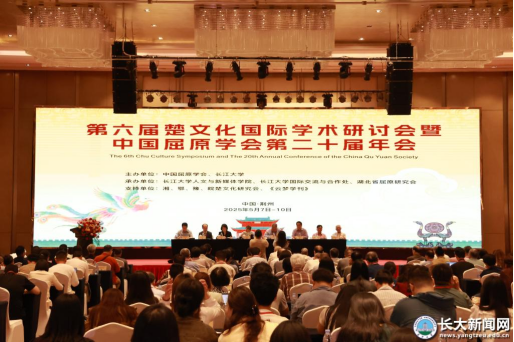On May 8, the 6th International Academic Symposium on Chu Culture and the 20th Annual Conference of the Chinese Association of Quyuan were held at Yangtze University. The symposium was jointly hosted by the Chinese Association of Quyuan and Yangtze University, and jointly organized by the School of Humanities and New Media, the Office of Internation Exchange and Cooperation of Yangtze University, and the Hubei Provincial Association of Quyuan.

Wang Zhimin, the former Vice Chairman of the Shandong Provincial Political Consultative Conference and Distinguished Senior Professor at Shandong Normal University; Fang Ming, President of the Chinese Association of Quyuan and Professor at Beijing Language and Culture University; Wang Jianping, the Secretary of the Party Committee of Yangtze University; and Guo Xiaorong, a member of the Standing Committee of the Jingzhou Municipal Committee and Minister of the Propaganda Department, attended the opening ceremony. The opening ceremony was hosted by He Shilong, the Dean of the School of Humanities and New Media of Yangtze University.
More than 300 experts and scholars from research institutes and universities such as the Chinese Academy of Social Sciences, Tsinghua University, Renmin University of China, Shandong University, Wuhan University, the University of Tokyo (Japan), Northeastern University, Toyama University, and Sookmyung Women’s University (South Korea) participated in the conference.
Guo Xiaorong, on behalf of the Municipal Party Committee and Municipal Government, warmly welcomed experts and scholars from both home and abroad. She stated that the five major series of exquisite cultural relics unearthed in Jingzhou—Chu bamboo slips, silk fabrics, bronze ware, jade artifacts, and wooden lacquerware—narrate the magnificent chapter of “The State of Chu for 800 Years, Flourishing in Jingzhou”, witnessing the integration process of Chinese civilization characterized by “diversity within unity”. This serves as an important foundation for us to further strengthen our cultural confidence. In recent years, the Jingzhou Municipal Party Committee and Government have placed great emphasis on the creative transformation and innovative development of excellent traditional Chinese culture, energetically promoting the inheritance and development of Chu culture through cultural preservation and innovation. She hopes that all participating experts will utilize Jingzhou as a window to establish a sustainable platform for international academic exchange, making Chu cultural research an important vehicle for telling China’s stories and spreading China’s voice.

Wang Jianping, Secretary of the Party Committee of Yangtze University, extended congratulations on the convening of the seminar on behalf the university. He expressed that Chu culture, as an important source of Chinese civilization, provides valuable insights for contemporary social development with its pioneering spirit, innovative ethos, and inclusive attitude. Qu Yuan’s patriotism and quest for knowledge transcend time and space, playing a significant role in cultivating national spirit and enhancing cultural confidence. As a university located in the former capital of the State of Chu, Yangtze University has always taken the inheritance of Chu culture as its mission. Relying on platforms such as the Jingchu Cultural Research Center, the university has achieved a series of innovative results in the research of Chu culture. He stated that this conference is not only a vivid practice of civilizational exchange and mutual learning but will also inject new vitality into the study of Chu culture. The university is willing to collaborate with colleagues from all sectors to delve deeper into the connotations of Chu culture, allowing this outstanding traditional culture of China to rejuvenate in the new era and contribute to the progress of human civilization.
At the opening ceremony, speeches were delivered respectively by Wang Zhimin, Professor Taniguchi Hiroshi from the University of Tokyo, Huang Fengxian, Party Branch Secretary, Vice President, and Secretary-General of the Chinese Association of Quyuan, and Liu Shilin, senior member of the Chinese Association of Quyuan and Associate Researcher at the Qu Yuan Memorial Hall in Miluo City, Hunan Province.
During the keynote speech session, experts and scholars including Tang Zhangping, Taniguchi Hiroshi, Zhao Minli, Cao Shenggao, Cheng Pingshan, Yin Hongbing, Song Yixiao, and Gao Xu presented reports focusing on topics such as studies of Qu Yuan and Chu Ci, history and culture of the Chu State, and Chu bamboo slips and cultural relics from the Chu region.
In the group discussion sessions, participating experts and scholars engaged in enthusiastic discussions on themes including “Research on the Chu State and Chu Culture”, “Research on Qu Yuan and Chu Ci”,“Chu Ci and Unearthed Documents”, “Scripts of Chu Bamboo Slips”, and “Chu Culture and Unearthed Documents”, etc..
The conference also hosted a postgraduate academic forum, with over 80 postgraduate and PhD students from universities such as Peking University, Beijing Normal University, Fudan University, Shandong University, and Minzu University of China participating in the discussions.